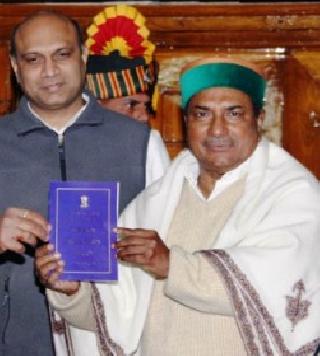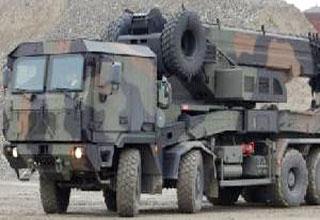
Defence Minister A K Antony unveils the new Defence Production Policy of India. A PIB photo
NEW DELHI (PTI): India's first ever Defence Production Policy that is aimed at achieving over 50 per cent indigenisation over the next decade was unveiled Thursday, as the Government said dependency on foreign imports for national security was "unacceptable".
The keenly awaited policy (DPrP) released by Defence Minister A K Antony aims to achieve self-reliance in design, development and production of defence equipment, weapon systems and platforms.
The policy, to be implemented with immediate effect, also envisages a major role for the private sector in defence manufacturing.
"More than 50 per cent," Antony said, when asked about the Government's aim in terms of percentage in indigenising defence manufacturing through the new policy.
"Self reliance is a long dream but we are still far behind...We need to strengthen our security apparatus in view of the prevailing security scenario, which is highly volatile and causes anxiety," Antony said.
He said dependence on foreign imports for national security was "unacceptable" and through the new policy, the Government hoped to build a strong defence industrial base in the country to change the situation.
The Minister said the policy would create conducive conditions for private industries to play an active role to achieve the objective and also aims to provide them a level-playing field in the sector.
Antony said from now on, preference will be given to indigenous design, development and manufacture of defence equipment coming from both public and private sectors.
"Wherever the required arms, ammunition and equipment are possible to be made by the Indian industry within the time lines required by the Services, the procurement will be made from the indigenous sources," he said.
The Minister said in cases where the Indian industry is not in a position to make and deliver the equipments in the requisite time frame, procurement from foreign sources would be resorted to as per the DPrP.
Based on the approved Long Term Integrated Perspective Plan (LTIPP), equipment, weapon systems and platforms required ten years and further down the line will by and large be developed within the country, Antony said.
However, the new policy allows sub-systems that are not economically viable or practical to be made within the country, to be imported and calls for ensuring that they are available at all times.
To assess the self reliance achieved through the year, the Defence Minister will hold an annual review of the progress made.
Under the DPrP, a separate fund will be created to provide necessary resources to public and private sector as well as academic and scientific institutions to support research and development of defence products.
To match the global standards in the defence sector in terms of price and time lines, the policy also allows the formation of consortia, joint venture and public private partnerships within the government approved framework.
It also seeks the involvement of academia, research and development institutions, technical and scientific organisations of repute for achieving the objective.
The DPrP has been prepared after consultations with various stakeholders such as the three Services, Integrated Defence Staff, Defence Research and Development Organisation (DRDO) and various chambers of commerce.
Reacting to the new policy, Confederation of Indian Industries (CII) said, "We appreciate the policy acknowledging that private sector would have to play a larger role in defence production.
We anticipate that an implementation road map with benchmarks would be announced sooner."
The other major chamber FICCI said policy-making Defence Ministry officials should be removed from the boards of Defence PSUs and they "should be corporatised and publicly listed to increase their public accountability and bring them on par with private sector producers."
 Previous Article
Previous Article Next Article
Next Article













The Indian Air Force, in its flight trials evaluation report submitted before the Defence Ministry l..
view articleAn insight into the Medium Multi-Role Combat Aircraft competition...
view articleSky enthusiasts can now spot the International Space Station (ISS) commanded by Indian-American astr..
view article